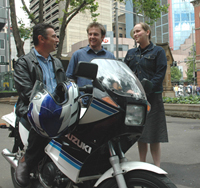by Joseph Smith

Nick Hadges is a busy man. An apprentice with the Ministry Training Strategy, part of his week is spent as a paid youth worker at St David's, Arncliffe. The motorbike riding, Greek-born pastor also teaches scripture in several local high schools.
Mr Hadges, 43, wants to minister to young people for the rest of his life. That's why he is keen on a move to allow people like him to become ordained as deacons without the expectation that he will give up youth work one day to become a priest.
"I don't see youth ministry as a stepping stone, it's a specialised ministry I want to work hard at and do long term," he said. "Making it a formal position would make it more credible in the high school environment. If I have those formal credentials backing me, teachers and principals might bring down the barriers to new initiatives I might have."
A decision by the Synod has meant for the first time Christian men are likely to be trained and ordained as deacons without going on an automatic trajectory to the priesthood.
Women, too, will lose the negative stigma of becoming a deacon, often seen as a temporary, second-class measure. It is hoped that a permanent or "distinctive' diaconate will be attractive to people considering a future in ministry but could not see how it were possible.
It will also be easier for people to relinquish their holy orders when they are no longer licensed as a deacon, such as women who marry and fall pregnant and choose not to work.
The move is likely to broaden the range of ministries officially recognised in the Diocese.
It's something Archbishop Peter Jensen has resisted for decades. But the Mission freight train is gathering speed, and now he says the separation of the requirements for ordination of priests and deacons is a risk "demanded" by the 10 per cent goal.
"The needs of the Mission are such that we've had to find a way in which to prepare people well for the variety of jobs deacons do but allow for more flexibility in approach," Dr Jensen said.
The Rev Mark Charleston, Senior Assistant to Dean Phillip Jensen in his role as Director of Ministry Training and Development, said theological qualifications may differ from one specialist ministry to another.
"The next step will be to investigate and develop the criteria for specialist deacons," he said. Detailed plans will be available early next year.
Emma Collett, 28, the paid children and families worker at Christ Church, St Ives " one of the largest churches in the Diocese " says the change will help put children's ministry on the map.
"It's only the third year of an employed children's minister at my church so I think the ministry is becoming more recognised, but this hasn't always been the case. These changes will definitely help."
Ms Collet coordinates up to 100 people who teach scripture and Sunday school and is working towards a Masters of Divinity at the Sydney Missionary and Bible College. She says both training and recognition are important for her position.
Matt Davies, 26, is halfway through his ministry apprenticeship and says he is considering his options. Mr Davies, who works with Christians in the Media at the University of Technology, Sydney and at St Aidan's, Annandale, admits becoming the rector of a large church "isn't playing to my strengths'. He says his experience with the media outreach could help him assist in starting up new ministries.
"If a niche ministry was planted and those skills were needed I could help out there," he said. "It takes a certain kind of person to start ministries from scratch. They could benefit from core members who are trained deacons, who have experience in that area and can do that full time.
"A specialised diaconate would be a good way for them to recognise the skills and experience I have. That's definitely a path I could go down."
Dr Jensen insists that there will still be an important place for paid and voluntary lay people in ministry.
"It doesn't mean, for example, all youth workers will be deacons. There will still be plenty of people out there who aren't ordained, but it will give a greater number of people the authority for ministry which will help make them more available," he said.
"Training is the petrol in the tank which is going to help that happen. It certainly won't be a matter of a "quickie ordination'."























